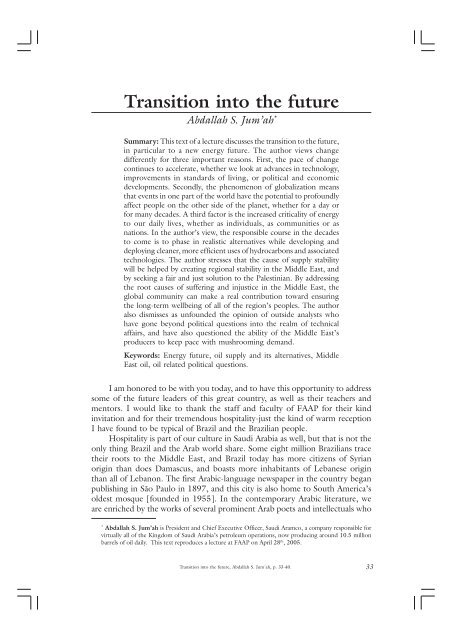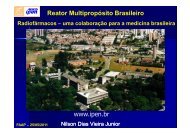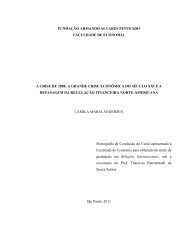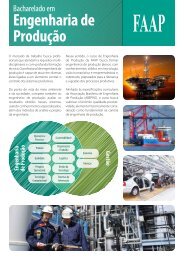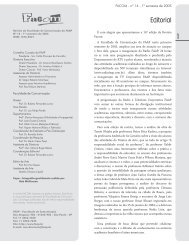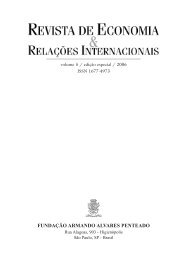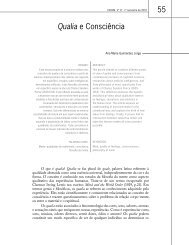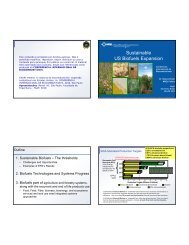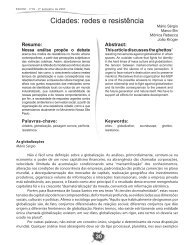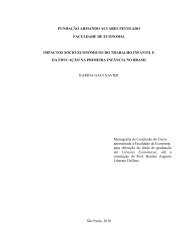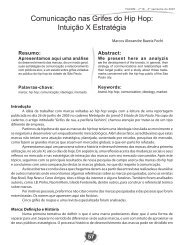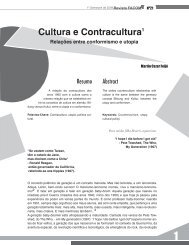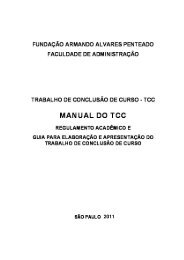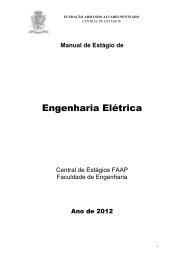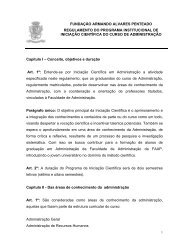Número 8 - Janeiro 2006 - Faap
Número 8 - Janeiro 2006 - Faap
Número 8 - Janeiro 2006 - Faap
Create successful ePaper yourself
Turn your PDF publications into a flip-book with our unique Google optimized e-Paper software.
Transition into the future<br />
Abdallah S. Jum’ah *<br />
Summary: This text of a lecture discusses the transition to the future,<br />
in particular to a new energy future. The author views change<br />
differently for three important reasons. First, the pace of change<br />
continues to accelerate, whether we look at advances in technology,<br />
improvements in standards of living, or political and economic<br />
developments. Secondly, the phenomenon of globalization means<br />
that events in one part of the world have the potential to profoundly<br />
affect people on the other side of the planet, whether for a day or<br />
for many decades. A third factor is the increased criticality of energy<br />
to our daily lives, whether as individuals, as communities or as<br />
nations. In the author’s view, the responsible course in the decades<br />
to come is to phase in realistic alternatives while developing and<br />
deploying cleaner, more efficient uses of hydrocarbons and associated<br />
technologies. The author stresses that the cause of supply stability<br />
will be helped by creating regional stability in the Middle East, and<br />
by seeking a fair and just solution to the Palestinian. By addressing<br />
the root causes of suffering and injustice in the Middle East, the<br />
global community can make a real contribution toward ensuring<br />
the long-term wellbeing of all of the region’s peoples. The author<br />
also dismisses as unfounded the opinion of outside analysts who<br />
have gone beyond political questions into the realm of technical<br />
affairs, and have also questioned the ability of the Middle East’s<br />
producers to keep pace with mushrooming demand.<br />
Keywords: Energy future, oil supply and its alternatives, Middle<br />
East oil, oil related political questions.<br />
I am honored to be with you today, and to have this opportunity to address<br />
some of the future leaders of this great country, as well as their teachers and<br />
mentors. I would like to thank the staff and faculty of FAAP for their kind<br />
invitation and for their tremendous hospitality-just the kind of warm reception<br />
I have found to be typical of Brazil and the Brazilian people.<br />
Hospitality is part of our culture in Saudi Arabia as well, but that is not the<br />
only thing Brazil and the Arab world share. Some eight million Brazilians trace<br />
their roots to the Middle East, and Brazil today has more citizens of Syrian<br />
origin than does Damascus, and boasts more inhabitants of Lebanese origin<br />
than all of Lebanon. The first Arabic-language newspaper in the country began<br />
publishing in São Paulo in 1897, and this city is also home to South America’s<br />
oldest mosque [founded in 1955]. In the contemporary Arabic literature, we<br />
are enriched by the works of several prominent Arab poets and intellectuals who<br />
* Abdallah S. Jum’ah is President and Chief Executive Officer, Saudi Aramco, a company responsible for<br />
virtually all of the Kingdom of Saudi Arabia’s petroleum operations, now producing around 10.5 million<br />
barrels of oil daily. This text reproduces a lecture at FAAP on April 28 th , 2005.<br />
Transition into the future, Abdallah S. Jum´ah, p. 33-40.<br />
33


